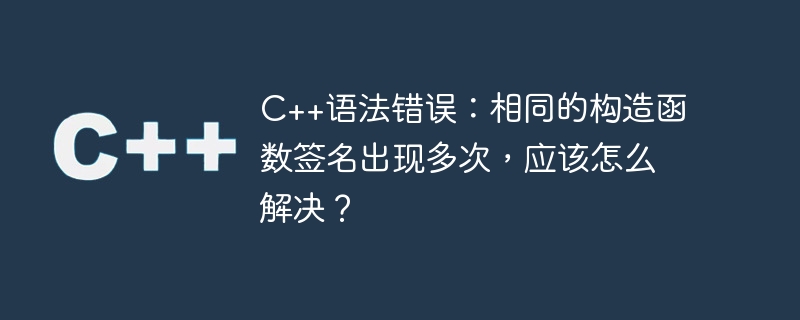

C is a powerful programming language, but during use, you will inevitably encounter various problems. Among them, the same constructor signature appearing multiple times is a common syntax error. This article explains the causes and solutions to this error.
1. Cause of error
In C, the constructor is used to initialize the data members of the object when creating the object. However, if the same constructor signature is defined in the same class (that is, the parameter types and order are the same), the compiler cannot determine which constructor to call, causing a compilation error.
For example, the following code has the same constructor signature:
class A{
public:
A(int a, int b){
this->a = a;
this->b = b;
}
A(int c, int d){
this->c = c;
this->d = d;
}
private:
int a, b, c, d;
};In the above code, two identical constructor signatures are defined in class A: A(int,int ). This will cause the compiler to be unable to determine which constructor to call, resulting in a syntax error.
2. Solution
In order to solve the same constructor signature problem, we can use function overloading and function default value.
Function overloading allows us to define multiple functions with the same name but different parameter lists in the same class. Therefore, we can write different constructors for different parameter lists and avoid having the same constructor signature.
For example, for class A above, we can define the constructor in the following way:
class A{
public:
A(int a, int b){
this->a = a;
this->b = b;
}
A(int c, int d, int e){
this->c = c;
this->d = d;
this->e = e;
}
private:
int a, b, c, d, e;
};In the above code, we define two different constructor signatures: A(int ,int) and A(int,int,int), thereby avoiding the same constructor signature problem.
Function default values allow us to provide default values for the parameters of a function. Therefore, we can specify different default values for the same constructor signature and avoid compilation errors.
For example, for the above class A, we can define the constructor in the following way:
class A{
public:
A(int a, int b, int c=0, int d=0){
this->a = a;
this->b = b;
this->c = c;
this->d = d;
}
private:
int a, b, c, d;
};In the above code, we define the constructor A(int,int,int,int) The last two parameters of A(int, int) specify default values, thus avoiding the same constructor signature problem as A(int, int).
3. Summary
In C, the same constructor signature will cause compilation errors. In order to avoid this error, we can use function overloading and function default values. This not only allows us to design the constructor of the class more flexibly, but also improves the readability and maintainability of the program.
The above is the detailed content of C++ syntax error: The same constructor signature appears multiple times, how to solve it?. For more information, please follow other related articles on the PHP Chinese website!
 How to buy Bitcoin
How to buy Bitcoin
 How to use the norm function in python
How to use the norm function in python
 How the tcp three-way handshake works
How the tcp three-way handshake works
 The difference between currentregion and usedrange
The difference between currentregion and usedrange
 Is java front-end or back-end?
Is java front-end or back-end?
 How to solve the problem that the print processor does not exist
How to solve the problem that the print processor does not exist
 Introduction to SEO diagnostic methods
Introduction to SEO diagnostic methods
 What is a browser plug-in
What is a browser plug-in




